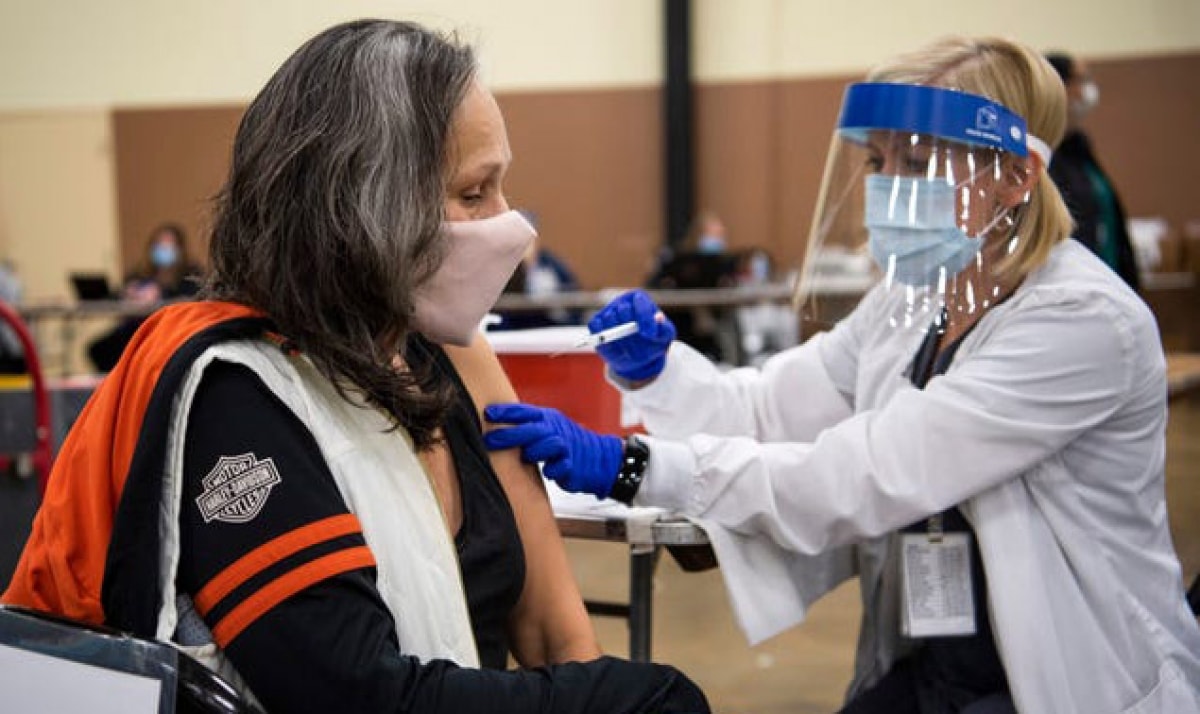Will America escape the Covid-19 nightmare?
Scientists say increased immunity and changes in human behavior are behind the recent decline in Covid-19 cases in the US, but there are still many unknowns.
After a severe summer surge due to the rapid spread of the Delta variant, the SARS-CoV-2 virus appears to be “in retreat” in the United States.
The US is recording about 90,000 new Covid-19 cases a day, down more than 40% since August. Hospitalizations and deaths from Covid-19 are also down.
 |
| Covid-19 vaccination in the US. Photo: Getty Images |
However, the pandemic situation has not yet eased across the US, with Alaska still seeing a surge in SARS-CoV-2 infections. However, nationwide, a clear downward trend in cases is visible, giving hope that the worst for the US may be over.
Over the past two years, the United States has experienced multiple Covid-19 outbreaks that have overwhelmed hospitals. It is difficult to understand why the virus has proliferated and spread in each outbreak, making it difficult to predict how the pandemic will develop in the future.
As winter approaches, there are reasons to be optimistic about the pandemic in the United States. Nearly 70% of adults are fully vaccinated, and many children under 12 may be eligible in the coming weeks. Federal regulators will soon approve the first antiviral drug to treat Covid-19.
But scientists warn that the pandemic is far from over. The US is still recording nearly 2,000 deaths a day, and a new outbreak in the winter is possible. Many Americans are still unvaccinated, and it is too early to lift basic prevention measures, experts say.
Flatten the curve
When the first wave of Covid-19 hit the US in early 2020, there was no vaccine and no one was immune to SARS-CoV-2. At the time, the only way to flatten the pandemic curve was to change people's behavior.
The US has ordered people to stay home, closed businesses, mandated mask-wearing and banned large gatherings to slow the first wave. There is still debate about which measures are most effective, but many studies show that overall all of them have made a difference, keeping people home and preventing cases from rising.
“Once the cases decline, the measures will be lifted,” said Jennifer Nuzzo, an epidemiologist at Johns Hopkins University.
Then, virus cases will rise again and similar patterns of containment will emerge. Businesses and local governments will reimpose restrictions.
According to a survey of Covid-19 trends and impacts in the US, during the winter of 2020, the rate of people going to bars, restaurants or attending large events decreased.
“The pandemic curve is shaped by public perception. We are teetering between crisis and complacency,” said Nuzzo.
The Delta variant emerged as the US was struggling to contain the pandemic, and at a time when many vaccinated Americans were starting to feel more secure about the disease. Research data shows that the emergence of the Delta variant has prompted less behavioral changes than previous waves of the pandemic.
According to the University of Washington’s Institute for Health Metrics and Evaluation, in mid-July, just 23% of Americans said they always wore a mask in public, the lowest rate since March 2020. By August 31, the peak of the Delta variant surge, that number had risen to 41%, though still well below the 77% who always wore masks in the winter.
But even small changes in behavior can help slow the spread of the virus. The Delta variant has prompted changes at both the individual and organizational levels. Schools have adopted new precautions, businesses have postponed reopenings, and organizations have canceled events, making the virus less contagious.
Increase immunity
Changing behavior is a temporary, short-term measure to reduce the number of cases. According to the NY Times, the real end of the pandemic will come through immunity.
The Delta variant caused the first major outbreak after widespread vaccination. The Delta variant is so transmissible that it spread rapidly through vulnerable communities, providing natural immunity to many unvaccinated Americans.
While neither vaccination nor previous infection provides complete protection against SARS-CoV-2, they do significantly reduce the risk of infection, so by September, the SARS-CoV-2 virus was having a harder time “finding hosts to infect.”
“The Delta variant is running out of people to infect,” said Jeffrey Shaman, an infectious disease epidemiologist at Columbia University.
The fact that cases are falling does not mean a country has achieved herd immunity, a goal many scientists now consider unattainable. However, rising vaccination and infection rates, coupled with behavioral changes, could end the surge in cases.
“It's a combination of immunity, but people still need to be vigilant,” said Joshua Salomon, an infectious disease specialist.
Scientists say a combination of factors, which may vary by region, will determine when and why outbreaks flare up and then subside. “Covid-19 outbreaks depend on factors such as the size of the previous wave, how many people have been vaccinated, and the emergence of new variants,” said Alessandro Vespignani, director of the Network Science Institute at Northeastern University in Boston.
Pandemic forecasts
Scientists warn that it is difficult to predict the upcoming epidemic situation in the US.
Britain and Israel, both countries with higher vaccination rates than the United States, are still facing Covid-19 outbreaks.
“This is a wake-up call. Don’t think the pandemic is over,” said Michael Osterholm, director of the Center for Infectious Disease Research and Policy at the University of Minnesota.
Most experts say they wouldn't be surprised to see at least one surge in cases in late fall or winter as people begin to spend more time indoors and travel for the holidays.
But because vaccines remain highly effective at preventing hospitalizations and deaths from Covid-19, any spike in cases next winter will likely be less bad than in 2020.
“It is possible that the number of deaths from Covid-19 this winter will not be as high as last winter, unless a new variant emerges,” Dr. Salomon said./.


